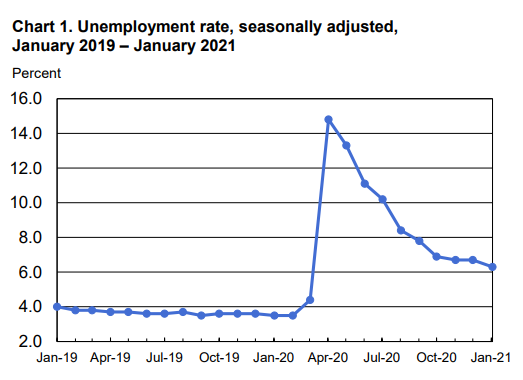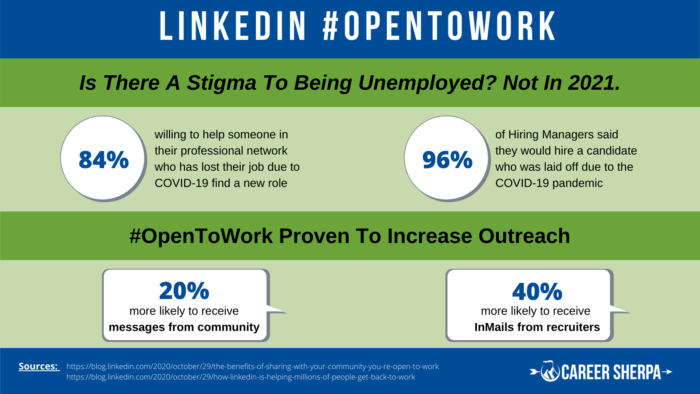Title:Should You Use LinkedIn's #OpenToWork
Author:Hannah Morgan
Date:March 2021
Source:Career Sherpa - Reprinted with permission
Should you broadcast you are looking for work and use LinkedIn's #OpenToWork? It's that green banner around the LinkedIn profile photo. See what the data says then you can make an informed decision.
Job hunting today is different than ever before. Rules and stigmas need to be broken. Especially for those that are unemployed.
So let me say, right up front, if you are unemployed and looking, consider turning on #OpenToWork (after reading the reasons below). If you are employed and looking DO NOT turn it on. You don't want your employer to find out.
The pandemic forced millions of people to lose their jobs or furloughed them almost instantaneously. Never before have we seen such a massive drop in employment in such a short amount of time.
And I don't need to tell you, the jobs haven't all come back. Right now, the unemployment rate is 6.3%.

And jobs in certain industries may never reach pre-pandemic levels. This makes it very challenging for job seekers who are looking to pivot into a new industry or career.
Change In Perceptions
It's important to reiterate that this is not the 1980s where anyone who was unemployed had probably been fired (and was seen as damaged goods). This is 2021 where millions of our friends, family, and talented past colleagues are looking for a new job.
Furthermore, the loyalty agreement employers and employees held long ago no longer exists. It's every person for themselves. Sure, you should show loyalty to your job while you're employed, but no one is asking for long-term dedication. The average tenure with a company in 2020 is 4.1 years. That should tell you a lot.
The Fear and Desperation Is Real
Imagine for one second you were one of those people who, due to no fault of your own, found yourself jobless during the pandemic and lockdown.
- Few companies posted jobs
- No one knew how to conduct interviews virtually yet
- The only networking you knew how to do was over coffee or at conferences.
- You still had bills to pay
- Your industry or role may never come back
How would you feel? Desperate? Maybe not at first, but after 9, 10, 11 months, I bet you would. Please, let's show some empathy.
Today, many companies have started posting jobs again. They've figured out how to conduct video job interviews and have even onboarded new employees virtually. But networking is still challenging for many. The opportunities to meet new people exist only online and for many that is an obstacle (mentally or technically). LinkedIn is one place unemployed job seekers know to go.
So why would a job seeker NOT want all the help they could get announcing their availability for work?
Stop The Stigma
So to every career or job search coach that is still advising clients NOT to use LinkedIn's #OpenToWork banner because it appears desperate, you are wrong. These are desperate times and based on my conversations and the data below, there are more people today than ever before who would go out of their way to help someone who is looking for work.
There should be no shame in announcing a job search. Nii Ato Bentsi-Enchill started a conversation on LinkedIn about destigmatizing being unemployed. Learn about the positive and negative arguments of using LinkedIn's #OpenToWork green banner.
There should be no judgment of any kind, until you have walked a mile in a job seeker's shoes over the past 10-11 months.
Hiring managers have stopped believing in the stigma so it's time for us all to stop too.
Is It Unfavorable To Be Unemployed?
In Find Your Next Job More Quickly, LinkedIn asked if being unemployed positions job seekers unfavorably. Here's the answer they got:
Results in our data and feedback from hiring managers suggests it does not. In fact, when we surveyed hiring managers, nearly all (96%) said they would hire a candidate who was laid off due to the COVID-19 pandemic.
LinkedIn
LinkedIn Research On #OpenToWork
LinkedIn initially launched #OpenToWork in June, 2020. In Find Your Next Job More Quickly, LinkedIn reports:
More than three million members have chosen to add a public #OpenToWork photo frame since launching in June, and our data show that they are, on average, 40% more likely to receive InMails from recruiters.
Will #OpenToWork Increase Recruiter Outreach?
Does turning on LinkedIn's #OpenToWork (either publicly or privately) help? LinkedIn says:
Our data shows that turning on Open to Work on your LinkedIn profile increases your likelihood of getting a recruiter message by 2X. That means twice as many job opportunities.
FYI: Recruiters who use LinkedIn's recruiting tools can refine their search by filtering for candidates who have turned on #OpenToWork.
Your Community Wants To Help
Consider this. Anyone looking at a profile, comment or post on LinkedIn sees the profile photo and if it's there, the #OpenToWork green banner. That means that everyone will know the person is available.
Early results show that members who choose to add a public #OpenToWork photo frame are 20% more likely to receive messages from their community.
Many people want to help and seeing the #OpenToWork banner makes that possible. LinkedIn research says:
[I]n our recent survey 84% of people said they would be willing to help someone in their professional network who has lost their job due to COVID-19 find a new role!
Referrals Count A Lot
Everyone knows how powerful networking is. But it can be difficult to explain exactly how it works. It's a little unscientific.
What we know is that referrals can open doors. You never know who may be able to refer you for a job or who people know.
Members were 4x more likely to get hired when they leveraged their networks on LinkedIn while job seeking.
LinkedIn
And
almost 90% of hiring managers surveyed said referrals are important when filling an open position.
LinkedIn
Share These Stats

The Banner Doesn't Take Away, It Adds
Adding the #OpenToWork banner doesn't appear in the headline or take up space from your profile. It adds important information to your profile picture. And your profile picture shows up in search results. So no harm done.
It Isn't Enough To Just Use #OpenToWork?
Setting your profile to show you are publicly #OpenToWork isn't enough. You must have a robust LinkedIn profile. It must show you're qualified for the roles you target. In other words, your profile has to show the skills, knowledge and experience recruiters and hiring managers need. And you control what's in your LinkedIn profile.
That means you need to invest time in these four areas of your LinkedIn profile:
- Headline
- About
- Experience
- Skills
And extra bonus points if you make it a point to post and comment regularly on LinkedIn.
Here's My Final Point
If your LinkedIn profile clearly and thoroughly explains your qualifications, then you do not appear desperate. You are just drawing extra attention to your strong credentials when you use LinkedIn's #OpenToWork green banner.
Go ahead, maximize your profile. First, record the number of people who view your profile and number of InMail messages or contacts you receive for job opportunities. Next, turn on the #OpenToWork banner publicly and record the new numbers after a couple of weeks. You have nothing to lose in experimenting with #OpenToWork.
Here are LinkedIn's instructions on how to turn on #OpenToWork

